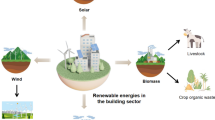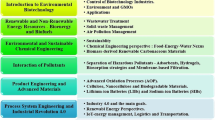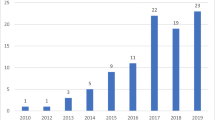Abstract
Growing concerns about climate change and energy security have led to a strong focus on energy demand reduction and energy efficiency within United Kingdom (UK) energy policy. At the same time, information and communication technologies (ICTs) have become pervasive in society and this has brought with it new policy options which use them as enabling technologies. One such policy option planned for implementation in the UK is the use of smart meters and real-time displays to encourage people to become more aware of their energy consumption and possibly change their energy-related behaviours. Smart meters and display units by definition link individuals, technologies and society, and their effectiveness is influenced by a range of factors. Ten semi-structured stakeholder interviews with industry, government and academia and a review of literature were conducted in order to identify which factors are most likely to contribute to the effectiveness of implementing smart meters and real-time displays in the UK. Further analysis showed a number of key themes and perspectives on behavioural change, particularly as they relate to household electricity use and the role of smart meters in the UK energy policy, including the role of ICTs in energy demand reduction more generally.

Similar content being viewed by others
Notes
As of 28 June 2007, the Department of Trade and Industry (DTI) was superseded by the Department for Business, Enterprise and Regulatory Reform (BERR). Department of Energy and Climate Change (DECC) was established in October 2008 and deals with UK energy and climate policy.
References
Abrahamse, W., Steg, L., Vlek, C., & Rothengatter, T. (2005). A review of intervention studies aimed at household energy conservation. Journal of Environmental Psychology, 25, 273–291.
Bamberg, S., & Schmidt, P. (2003). Incentives, morality, or habit? Predicting students’ car use for university routes with the models of Ajzen, Schwartz, and Triandis. Environment and Behavior, 35, 264–285.
Becker, L. J. (1978). Joint effect of feedback and goal setting on performance: a field study of residential energy conservation. The Journal of Applied Psychology, 63(4), 428–433.
Becker, L. J., Seligman, C., Fazio, R. H., & Darley, J. M. (1981). Relating attitudes to residential energy use. Environment and Behavior, 13, 590–609.
BERR (2008a). Energy consumption tables: domestic energy consumption tables. Table 3.16, Internal and external temperatures, 1976 to 2004. Department for Business Enterprise & Regulatory Reform. http://webarchive.nationalarchives.gov.uk/20070905152639/http://www.berr.gov.uk/energy/statistics/publications/ecuk/domestic/page18071.html. Accessed 25 March 2010.
BERR (2008b). Energy consumption tables: domestic energy consumption tables. Table 3.10: Total electricity consumption by household domestic appliances 1970 to 2005, http://webarchive.nationalarchives.gov.uk/20070905152639/http://www.berr.gov.uk/energy/statistics/publications/ecuk/domestic/page18071.html. Accessed 25 March 2010.
Bertoldi, P., & Atanasiu, B. (2007). Electricity consumption and efficiency trends in the enlarged European Union—Status report 2006, Institute for Environment and Sustainability, European Commission.
Bittle, R. G., Valesano, R., & Thaler, G. (1979). The effects of daily cost feedback on residential electric consumption. Behaviour Modification, 3, 187–202.
Bittle, R. G., Valesano, R. M., & Thaler, G. M. (1979–1980). The effects of daily feedback on residential electricity usage as a function of usage level and type of feedback information. Journal of Environmental Systems, 9(3), 275–287.
Boardman, B., Darby, S., Killip, G., Hinnells, M., Jardine, C.N., Palmer, J., et al. (2005). 40% house, Environmental Change Institute, University of Oxford.
Darby, S. (2006). The effectiveness of feedback on energy consumption—a review for DEFRA of the literature on metering, billing and direct displays. Environmental Change Institute, Oxford University. http://www.eci.ox.ac.uk/research/energy/downloads/smart-metering-report.pdf. Accessed 25 March 2010.
DCLG (2008). Definition of zero carbon homes and non-domestic buildings, consultation. Department for Communities and Local Government, Crown Copyright.
Defra (2007). UK energy efficiency action plan, Department for Environment, Food and Rural Affairs.
DTI (2007). Meeting the energy challenge—a white paper on energy, Department of Trade and Industry.
EC (2009). Directive 2009/28/EC of the European Parliament and of the Council of 23 April 2009 on the promotion of the use of energy from renewable sources and amending and subsequently repealing Directives 2001/77/EC and 2003/30/EC Text with EEA relevance. http://eur-lex.europa.eu/LexUriServ/LexUriServ.do?uri=OJ:L:2009:140:0016:0062:EN:PDF. Accessed 25 March 2010.
Ek, K., & Söderholm, P. (2010). The devil is in the details: household electricity saving behavior and the role of information. Energy Policy, 38(3), 1578–1587.
Energy Retail Association (2007). Smart meters. London: ERA.
Erdmann, L., Hilty, L., Goodman, J., & Arnfalk, P. (2004). The future impact of ICTs on Environmental Sustainability, Institute for Prospective Technological Studies, European Commission Joint Research Centre.
EST (2006). Habits of a lifetime—European energy usage report, energy saving trust.
Fischer, C. (2007). Influencing electricity consumption via consumer feedback: a review of experience, Proceedings of the ECEEE 2007 Summer Study—Saving energy—just do it! ECEEE (pp. 1873–1885). France: Côte d’Azur.
Foresight Sustainable Energy Management and the Built Environment Project (2008). Final project report, The Government Office for Science, London.
Gärling, T., Eek, D., Loukopoulos, P., Fujii, S., Johansson-Stenman, O., Kitamura, R., et al. (2002). A conceptual analysis of the impact of travel demand management on private car use. Transport Policy, 9(1), 59–70.
Helm, D. (2004). Energy, the state, and the market: British energy policy since 1979, Rev. Oxford: Oxford University Press.
HM Government (2006). Climate Change and Sustainable Energy Act 2006.
HM Government (2009). The UK Low Carbon Transition Plan, National strategy for climate and energy. Crown Copyright. http://www.decc.gov.uk/en/content/cms/publications/lc_trans_plan/lc_trans_plan.aspx. Accessed 25 March 2010.
IEA 2009. World Energy Outlook. International Energy Agency. OECD/IEA, 2009.
Jackson, T. (2005). Motivating sustainable consumption, a review of evidence on consumer behaviour and behavioural change, sustainable development research network.
Knowles, H., & Goodman, J. (2005). Making the net work for the regions: ICT and sustainable development in regional strategies, Forum For the Future.
Koomey, J. G. (2007). Estimating the total power consumption by servers in the U.S. and the World, AMD.
Laitner, J. A. (2000). The information and communication technology revolution: can it be good for both the economy and the climate? Discussion draft for the energy end-use forecasting and market assessment group. Berkeley: Lawrence Berkeley National Laboratory.
Lees, E. (2007). Smart meters—costs and consumer benefits: report to energywatch, energywatch.
Maréchal, K. (2010). Not irrational but habitual: The importance of “behavioural lock-in” in energy consumption. Ecological Economics, 69(5), 1104–1114.
Martiskainen, M. (2007). Affecting consumer behaviour on energy demand—Final report to EdF Energy, Sussex Energy Group, SPRU—Science and Technology Policy Research, University of Sussex. http://www.sussex.ac.uk/sussexenergygroup/documents/seg_consumer_behaviour_final_report.pdf. Accessed 25 March 2010.
Martiskainen, M., & Watson, J. (2009). Energy and the citizen. In I. Scrase & G. MacKerron (Eds.), Energy for the future. A new agenda (pp. 165–182). Basingstoke: Palgrave Macmillan.
May, T. (2001). Social research: issues, methods and process, 3rd. Maidenhead: Open University Press.
Ofgem (2009). Energy demand research project, review of progress for period April 2008–August 2008, Ofgem.
OPSI (2008). Climate Change Act 2008. Office of Public Sector Information (OPSI). http://www.opsi.gov.uk/acts/acts2008/ukpga_20080027_en_1. Accessed 25 March 2010.
Owen, P. (2007). The ampere strikes back: how consumer electronics are taking over the world, energy saving trust.
Owen, G., & Ward, J. (2006). Smart meters: commercial, policy and regulatory drivers, sustainability first.
Owen, G. & Ward, J. (2007). Smart meters in Great Britain: the next steps? Sustainability First.
Owens, S., & Driffill, L. (2008). How to change attitudes and behaviours in the context of energy. Energy Policy, 36(12), 4412–4418.
Pamlin, D., & Szomolányi, K. (2006). Saving the climate @ the speed of light, ETNO.
Patterson, W. C. (1999). Transforming electricity: The coming generation of change. London: Earthscan.
Rip, A., & Kemp, R. (1998). Technological change. In S. Rayner & E. L. Malone (Eds.), Human choice and climate change: Volume 2: Resources and technology (pp. 327–399). Battelle: Columbus.
Roberts, S. (2008). Altering existing buildings in the UK. Energy Policy, 36(12), 4482–4486.
Roberts, S., & Baker, W. (2003). Towards effective energy information: Improving consumer feedback on energy consumption, Centre for Sustainable Energy; A report to Ofgem.
Steg, L. (2008). Promoting household energy conservation. Energy Policy, 36(12), 4449–4453.
Stern, P. C. (2000). New environmental theories: toward a coherent theory of environmentally significant behavior. Journal of Social Issues, 56(3), 407–424.
Wilsdon, J., & Miller, P. (2001). Digital Futures: an agenda for a sustainable digital economy, Forum for the Future.
Yin, R. K. (2003). Case study research: design and methods, 3rd. London: Sage Publications.
Young, S. (2006). Climate Change and ICT, Ovum Comments. http://www.ovum.com/go/content/c,67759. Accessed 25 March 2010.
Acknowledgements
The authors would like to thank Dr. Jim Watson for his valuable comments. The authors also acknowledge the funding support from EdF Energy and the Economic and Social Research Council for two research projects which were used as the basis for this article.
Author information
Authors and Affiliations
Corresponding author
Appendix
Appendix
List of interviewees
-
Charles Hargreaves, Head of Energy Efficiency, Ofgem, 22/6/2007.
-
Pedro Guertler, Senior Researcher, Association for the Conservation of Energy, 26/6/2007.
-
Alastair Manson, Consultant, Energy Retail Association, 26/6/2007.
-
Geoff Hatherick, Head of Consumer Policy, DBERR, 2/7/2007.
-
Sarah Darby, Research Councils’ Energy Programme Research Fellow, Environmental Change Institute, 3/7/2007.
-
Bob Lowe, Marketing Manager, Horstmann, 3/7/2007.
-
Government Official, Defra, 4/7/2007.
-
Jane Franklin, Commercial Metering Manager, Npower, 4/7/2007.
-
Alan Knight-Scott, Regulatory, Legal and External Communications Manager, EDF Energy, Home Technology Programme, 4/7/2007.
-
Richard Woods, Business Development Director, DIY Kyoto, 4/7/2007.
Rights and permissions
About this article
Cite this article
Martiskainen, M., Coburn, J. The role of information and communication technologies (ICTs) in household energy consumption—prospects for the UK. Energy Efficiency 4, 209–221 (2011). https://doi.org/10.1007/s12053-010-9094-2
Received:
Accepted:
Published:
Issue Date:
DOI: https://doi.org/10.1007/s12053-010-9094-2




